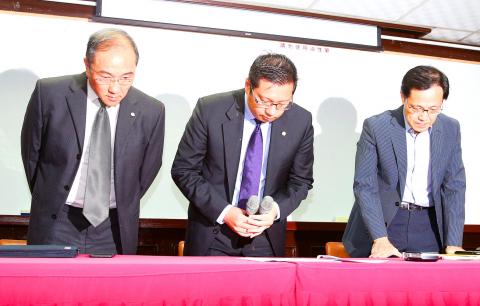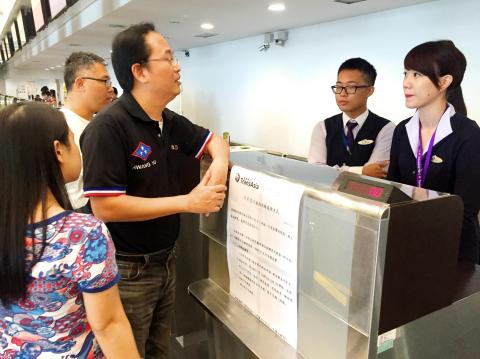TransAsia Airways Corp (復興航空) yesterday said it is to dissolve the company after its attempts to keep it afloat failed.
The company looked at options, including a sale, restructuring and capital injections, during three meetings between its board of directors and industry experts, TransAsia Airways chief executive officer Liu Tung-ming (劉東明) told a news conference at the Taiwan Stock Exchange.
“Despite our best efforts to devise a new business model, the company could not produce an effective turnaround plan to repair its deteriorating finances,” Liu said.

Photo: CNA
The airline said it is unable to repay US$75 million in European convertible bonds due on Tuesday next week.
The company’s net worth was estimated at about NT$5.44 billion (US$170.29 million), or a book value of NT$7.17 per share, as of the end of last month, TransAsia vice president Chen I-chieh (陳逸潔) said.
The airline operated 27 routes in Taiwan, China and the rest of Asia, each representing about a third of total sales, Chen said.

Photo: Lee Chung-hsien, Taipei Times
In the first three quarters, the company racked up losses of NT$2.2 billion, Liu said.
TransAsia chairman Vincent Lin (林明昇) blamed the declining number of Chinese visitors, as well as rising fuel prices and a strengthening US dollar, for the company’s steep losses.
TransAsia’s load factor had fallen to about 60 percent, which was well below its domestic peers’ and unsustainable, Lin said.
TransAsia shares are to resume trading today following yesterday’s suspension, but trading would be conducted on a full-cash delivery basis, the Financial Supervisory Commission (FSC) said.
At a news conference held jointly with the heads of government agencies yesterday, the Cabinet said that the impact of the airline’s closure would be limited and the company has enough cash to refund customers and cover severance pay.
An estimated 100,000 travelers are affected by the unexpected folding of the nation’s first commercial airline, but other carriers have capacity to take on passengers booked to fly with TransAsia as it is the off-season, Civil Aeronautics Administration (CAA) Air Transport Division director Han Chen-hua (韓振華) said.
TransAsia has created a trust fund to ensure that customers get a full refund on booked flights, and the company will not dismiss ticketing and customer service staff until Dec. 20, so that they can assist in the transfer of passengers to other airlines, the firm said.
The CAA formed a special task force immediately after TransAsia announced a temporary suspension of operations on Monday to ensure that travelers’ rights are protected, Fan said.
The CAA is to impose a fine of between NT$600,000 and NT$3 million on TransAsia for halting flights without seeking prior approval.
The CAA has conducted regular financial inspections on TransAsia, and the company still holds more than NT$1 billion in cash and is not facing an immediate financial crisis, Han said.
TransAsia has 1,735 employees and they are covered by labor insurance, while there is NT$310 million in the company’s pension fund account, Deputy Minister of Labor Kuo Kuo-wen (郭國文) said.
“The money is more than enough to pay employees’ pensions and the remaining amount can be used to cover severance pay,” Kuo said.
The FSC and prosecutors have launched an inspection into possible insider trading in the company’s shares, and it has yet to be determined whether company executives were involved, commission vice chairman Huang Tien-mu (黃天牧) said.
The Taiwan Stock Exchange on Aug. 15 listed TransAsia as financially unstable, to warn investors of the risk involved in trading the company’s shares, Huang said.

INVESTIGATION: The case is the latest instance of a DPP figure being implicated in an espionage network accused of allegedly leaking information to Chinese intelligence Democratic Progressive Party (DPP) member Ho Jen-chieh (何仁傑) was detained and held incommunicado yesterday on suspicion of spying for China during his tenure as assistant to then-minister of foreign affairs Joseph Wu (吳釗燮). The Taipei District Prosecutors’ Office said Ho was implicated during its investigation into alleged spying activities by former Presidential Office consultant Wu Shang-yu (吳尚雨). Prosecutors said there is reason to believe Ho breached the National Security Act (國家安全法) by leaking classified Ministry of Foreign Affairs information to Chinese intelligence. Following interrogation, prosecutors petitioned the Taipei District Court to detain Ho, citing concerns over potential collusion or tampering of evidence. The

‘FORM OF PROTEST’: The German Institute Taipei said it was ‘shocked’ to see Nazi symbolism used in connection with political aims as it condemned the incident Sung Chien-liang (宋建樑), who led efforts to recall Democratic Progressive Party (DPP) Legislator Lee Kun-cheng (李坤城), was released on bail of NT$80,000 yesterday amid an outcry over a Nazi armband he wore to questioning the night before. Sung arrived at the New Taipei City District Prosecutors’ Office for questioning in a recall petition forgery case on Tuesday night wearing a red armband bearing a swastika, carrying a copy of Adolf Hitler’s Mein Kampf and giving a Nazi salute. Sung left the building at 1:15am without the armband and apparently covering the book with a coat. This is a serious international scandal and Chinese

Seventy percent of middle and elementary schools now conduct English classes entirely in English, the Ministry of Education said, as it encourages schools nationwide to adopt this practice Minister of Education (MOE) Cheng Ying-yao (鄭英耀) is scheduled to present a report on the government’s bilingual education policy to the Legislative Yuan’s Education and Culture Committee today. The report would outline strategies aimed at expanding access to education, reducing regional disparities and improving talent cultivation. Implementation of bilingual education policies has varied across local governments, occasionally drawing public criticism. For example, some schools have required teachers of non-English subjects to pass English proficiency

TRADE: The premier pledged safeguards on ‘Made in Taiwan’ labeling, anti-dumping measures and stricter export controls to strengthen its position in trade talks Products labeled “made in Taiwan” must be genuinely made in Taiwan, Premier Cho Jung-tai (卓榮泰) said yesterday, vowing to enforce strict safeguards against “origin laundering” and initiate anti-dumping investigations to prevent China dumping its products in Taiwan. Cho made the remarks in a discussion session with representatives from industries in Kaohsiung. In response to the US government’s recent announcement of “reciprocal” tariffs on its trading partners, President William Lai (賴清德) and Cho last week began a series of consultations with industry leaders nationwide to gather feedback and address concerns. Taiwanese and US officials held a videoconference on Friday evening to discuss the